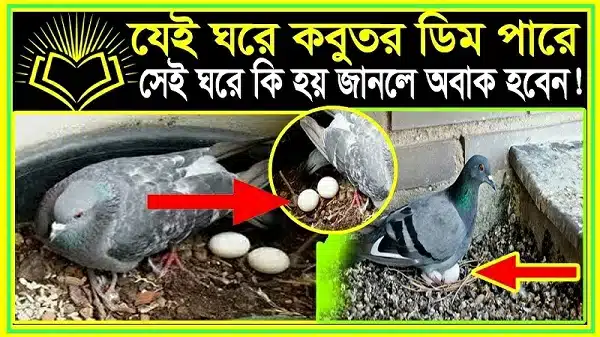Introduction
Pigeons, known for their distinctive cooing sounds and gentle nature, are fascinating birds that have a unique nesting behavior. When pigeons find a suitable location, they establish a nest and lay their eggs. In this article, we will explore what happens in the house where pigeons lay their eggs, from nest construction to the growth of the nestlings.

The Nesting Behavior of Pigeons
Pigeons are monogamous birds, meaning they mate for life. They exhibit strong homing instincts and are known to return to their nests year after year. Pigeons engage in elaborate courtship displays before choosing a mate and establishing a nesting site.
More Islamic Status Bangla….
🌙✨ Eid ul Adha Beauty Hacks: Glow Like a Star This Festive Season! 💄🎉🐑
QUOTES 100M+ MOST FAMOUS ALL TIME
SAD QUOTES | দুঃখজনক উক্তি ইসলামিক
Islamic Quotes | Inspirational Islamic Quotes:
Inspire Your Faith with Captivating Islamic Status
Choosing a Nesting Site
Pigeons typically choose elevated locations for their nests, such as rooftops, ledges, or tree branches. They prefer secluded areas that provide safety from predators. The availability of food and water sources nearby is also an important consideration.
Building the Nest
Pigeons construct their nests using twigs, grass, leaves, and other natural materials. The male and female pigeons work together to build the nest, with the male gathering materials and the female arranging them. Pigeon nests are relatively simple structures, but they provide a comfortable and secure environment for the eggs.
Laying and Incubating Eggs
Once the nest is built, the female pigeon lays one or two eggs. The eggs are usually white and elliptical in shape. Both the male and female pigeons take turns incubating the eggs, with each parent spending several hours a day sitting on the eggs to keep them warm. The incubation period lasts around 17 to 19 days.
Caring for the Hatchlings
When the eggs hatch, the parents continue to share parenting responsibilities. They regurgitate a nutritious substance called “pigeon milk” to feed the hatchlings. Pigeon milk is a secretion produced in the crop of the adult birds and is rich in proteins and fats. The parents take turns feeding the nestlings until they are ready to leave the nest.
Development and Growth of the Nestlings
As the nestlings grow, their feathers start to develop, and they become more active. The parents encourage exercise by fluttering their wings and coaxing the nestlings to move around the nest. The young pigeons become more independent and start exploring their surroundings within the nest.
Fledging and Leaving the Nest
After about four weeks, the nestlings reach a stage where they are ready to leave the nest. This process is known as fledging. The young pigeons take their first flights, practicing their flying skills under the watchful eyes of their parents. Once they become proficient flyers, they gradually leave the nest and start their independent lives.
Benefits and Challenges of Pigeon Nests
Pigeon nests offer several benefits for the birds. They provide a safe place for breeding and raising offspring, shielded from predators and harsh weather conditions. The nests also offer insulation and protection against extreme temperatures. However, the presence of pigeon nests in urban areas can sometimes lead to issues like noise, droppings, and damage to structures.
Conclusion
In conclusion, pigeons exhibit fascinating nesting behaviors when it comes to laying their eggs. From carefully choosing a nesting site to constructing a comfortable nest, and ultimately caring for their hatchlings until they are ready to fledge, pigeons demonstrate remarkable parenting skills. Understanding the life cycle of pigeons and their nesting habits can help us appreciate these remarkable birds that coexist with us in our urban environments.
FAQs
1. How many eggs do pigeons typically lay? Pigeons typically lay one or two eggs in each clutch.
2. How long does it take for pigeon eggs to hatch? The incubation period for pigeon eggs is around 17 to 19 days.
3. What is pigeon milk? Pigeon milk is a nutritious substance produced by adult pigeons in their crops. It is regurgitated and fed to the nestlings.
4. When do pigeon nestlings leave the nest? Pigeon nestlings usually leave the nest after about four weeks.
5. Are pigeon nests a cause for concern in urban areas? While pigeon nests offer benefits, their presence in urban areas can sometimes lead to issues like noise, droppings, and structural damage.
Tags:
Pigeon nesting behavior, House with pigeon eggs, Avian reproduction, Birdhouse observations, Pigeon breeding habits, Nesting rituals of pigeons, Domestic pigeon egg laying, Pigeon hatchlings development, In-house pigeon nesting, Pigeon incubation process, Fertility of pigeon eggs, House as a nesting site, Parental care of pigeons, Nest construction in pigeons, Pigeon egg incubation, Life cycle of pigeon eggs, Pigeon breeding in homes, Observation of pigeon nesting, House environment for pigeon eggs, Pigeon reproductive biology, Behavior of pigeons during nesting, Egg-laying patterns in pigeons, Pigeon breeding season, Pigeon chick hatching, Pigeon parenting behavior.
Leave a Reply